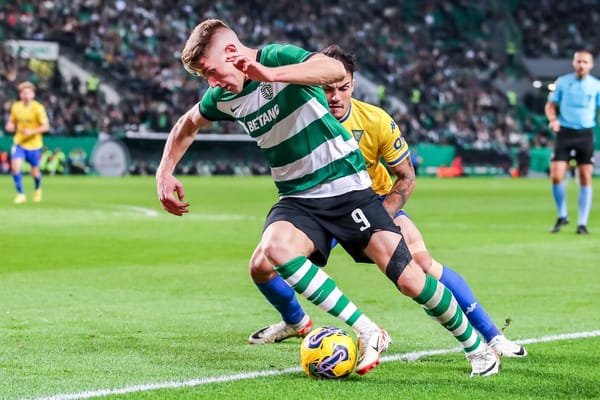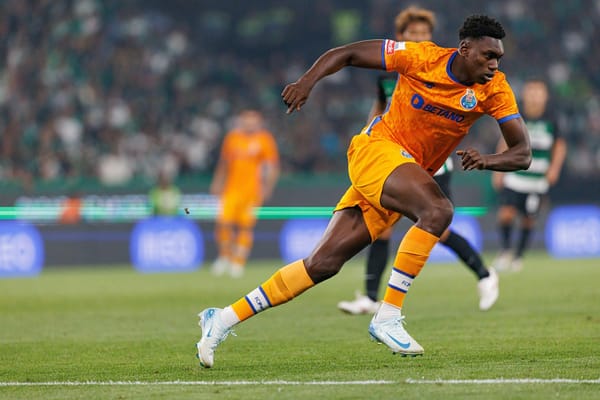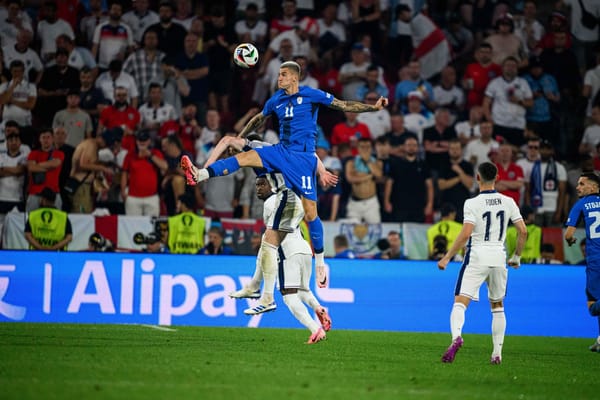Barcelona's Pyrrhic victory over Valencia
Perhaps it was poetic justice or just a part of a very carefully written script but the clash between Barcelona and Valencia at the Camp Nou was more than just a fixture to decide who gets the three points
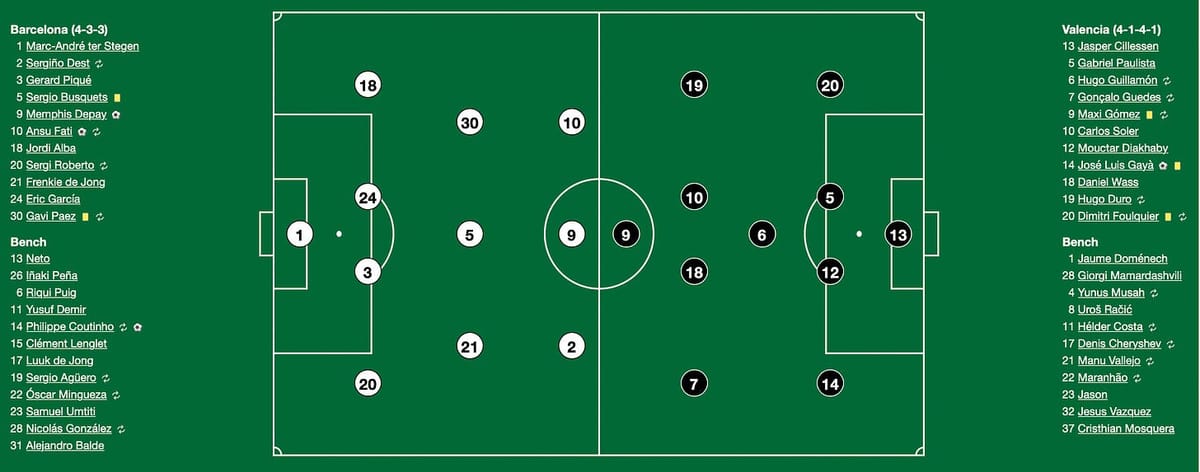
Perhaps it was poetic justice or just a part of a very carefully written script but the clash between Barcelona and Valencia at the Camp Nou was more than just a fixture to decide who gets the three points. Both teams are giants fallen from grace personified and both teams find themselves struggling to regain the greatness that was once theirs.
Of course, to make things even more fitting, both were also sitting on 12 points prior to yesterday’s game, making this an even tighter affair than many would’ve predicted beforehand. And it really is becoming a chore to predict how Barcelona will play on any given day.
Ronald Koeman’s decision-making can be questionable at times and the same can be said for the whole team’s performances. Barcelona used to be much more straightforward, thriving in the chaos of not knowing how they’re going to hurt the opposition. All they knew was that they would hurt them in the end.
Nowadays, they seem to be hurting themselves more than others. A worrying sign of a faltering titan of Spanish football. However, as much as beating a struggling if not still uninspiring Valencia won’t give us much clarity and peace of mind, it does provide us with hope.
Ansu Fati made his grand return after 340 days of being sidelined by a horrendous injury and, as expected, did not disappoint. On top of that, Sergio Agüero also made his debut for the Catalans, albeit with little real effect on the pitch. But for every positive, there is a concerning negative following it too, as is the custom at Barcelona as of late.
So what exactly went right? And what then ultimately followed on the other side of the coin?
Let’s find out.
Build-up and width
Koeman has been accused of fielding many different and yet equally faulty systems in the past. Barcelona as a team have lacked proper width and verticality for years now and the same has been true for their campaign(s) under the Dutchman’s watchful eye. Yesterday, however, we finally saw some improvements in the structure.
Barcelona’s attacking tactics have been very reliant on attacking full-backs. It’s the role popularised by Dani Alves in the golden years and ever since, that setup has been dominating every coach’s approach. But attacking full-backs work well with inverted wingers and natural wide men would eliminate the need for overlaps as they would mostly occupy the flank, hugging the touchline and stretching the pitch themselves.
But the problem suddenly pops out when you have inverted wingers, players like Philippe Coutinho, Antoine Griezmann or even Lionel Messi, but no quality in the full-back department. Jordi Alba is the obvious exception to this and the Spaniard has been the only real outlet Barcelona have had in a long time now. That in itself is worrying.
But yesterday we saw Koeman shuffle the deck a bit more. When people saw Sergi Roberto and Sergiño Dest in the starting XI, most were thinking the former would be in midfield and the latter at right-back. After all, that was what we were used to. But Koeman surprised us by deploying Roberto at right-back while using Dest as the right-winger. This enabled Barcelona to have some width. Finally.
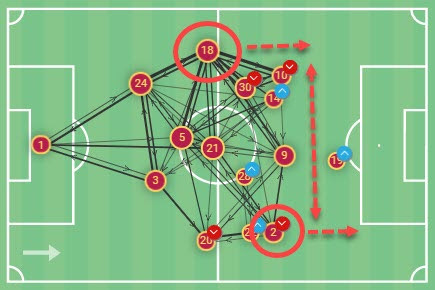
On the left, you had Alba (or Fati) stretching the pitch and on the right, there was finally someone capable of doing the same thing. Dest is a right-footer and when deployed on the left side, he inevitably cuts in onto his stronger foot. Why? It’s simple. Most players are more comfortable starting with their strong foot when trying to beat the marker. Naturally, being right-footed, Dest would have a better chance of beating his man by going to the right side and onto his strong foot, i.e. cutting inside. If he wanted to go wide whilst playing as a left-back, he would either have to use his left foot or start with the right but in that case, he’d also have to slide the ball across his body, giving the defender more time to tackle it.
Interestingly, there were also times when Dest inverted on the right but more importantly, he was able to hold the width when the team needed him to. So what’s the big deal with width anyway? It’s not like the American, or Alba for that matter, scored any goals? True but football is all about time and space. Barcelona’s main pieces are down the middle or in their respective half-spaces.
Think of Memphis Depay or Fati. Both can be outlets and attack space and hold width but more often than not, they’ll move centrally when on the ball. The same was true for Messi. Yes, he’d receive wide at times but that was only his starting position and nothing else. What other teams would then do is crowd the central channels, focusing on zone 14 and shutting the door towards the half-spaces. That effectively nullified Barcelona’s attacking setup because they had no width.
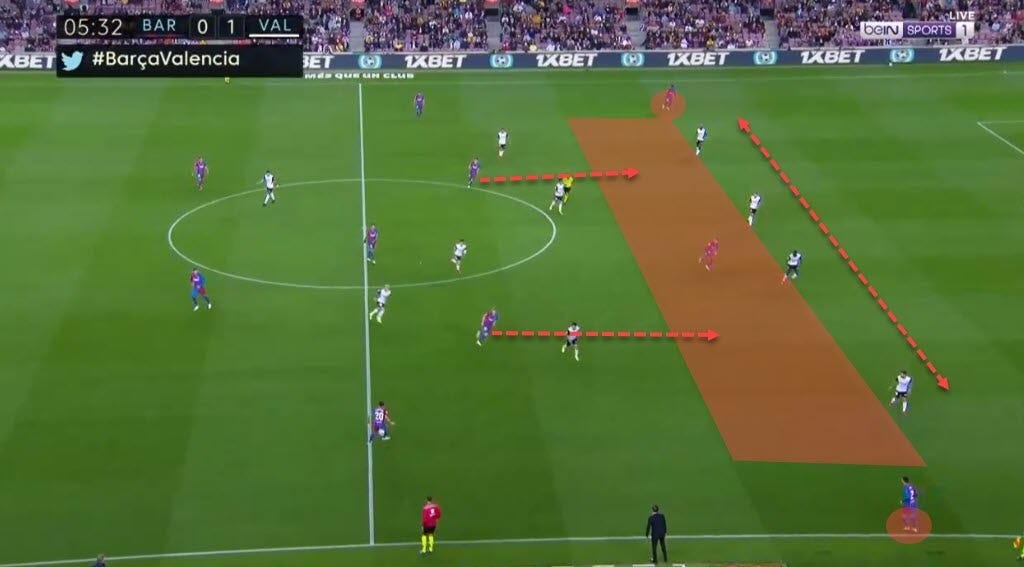
By using Alba (or Fati in cases like above) and Dest to provide width, the pitch and subsequently the opposition’s block, were stretched, creating more space horizontally and between the lines. Action and reaction. As a result, Memphis, Fati, Gavi and even Frenkie de Jong had more time and space to receive the ball in dangerous positions. But there’s one more aspect that needs to be commended - the build-up play.
If there’s one thing that hasn’t necessarily suffered as much in recent years, then it’s the build-up. Barcelona may not be as press-resistant as they once were, far from it, but they still have certain mechanisms that work. The basic premise of playing out from the back is coordination and achieving superiorities. Barcelona are still good at using the goalkeeper as an extra player but yesterday, they also cut through Valencia with ease.
Some of that is Valencia’s own doing, of course. They were not compact nor pressing particularly well but credit where it’s due, Koeman’s setup in the first phase was good. Barcelona were good at creating superiorities and that made their progression that much easier to achieve.
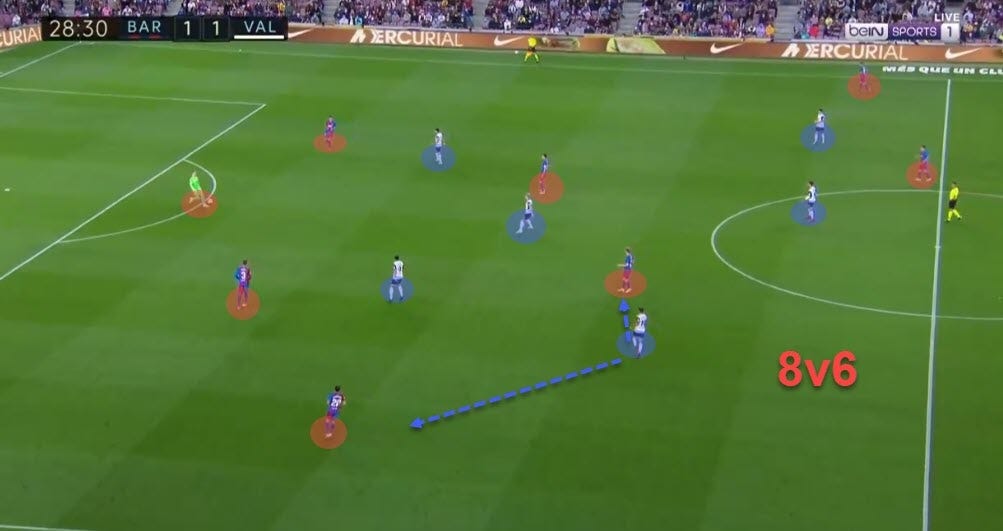
All of that ultimately ensured the likes of Fati and Memphis would see more of the ball and if possible, in isolation with their marker. Giving them 1v1 duels out wide or centrally was key to Barcelona’s chance creation and unsurprisingly, both players were instrumental in securing the victory.
Sadly, however, for all the positives, Barcelona once again showed some of the big flaws in their system.
Fragility but also hope
The clashes between Barcelona and Valencia are always goal fests. In the last 10 games, there have been 33 goals between the two teams and yesterday’s affair was no different. So in a way, it doesn’t surprise that we’ve seen the inside of the net rattled multiple times but what is still a big worry is Barcelona conceding and conceding early.
Even if we disregard the fact that the Catalans haven’t kept a clean sheet against Valencia in LaLiga since 2015, the trend they’re setting is worrying, to say the least. There has been a goal in the opening three minutes in three games of Barcelona’s last eight clashes, two of which were conceded by them. Similarly, in the last four games in which they’ve conceded a goal, that goal arrived with the first shot on target from the opposition.
Needless to say, this already speaks volumes of the leakiness of their defence. It has come to the point that even a team who’s struggling like Valencia are able to easily come into good situations to score. Yes, José Gayà’s rocket was incredible to open the scoring but it followed a scramble in the box and lack of any kind of coordination on Barcelona’s part.
The way they defend corners and stop transitions is non-existent. And as ever, the players who best personify this lack of defensive structure are the midfielders, namely Sergio Busquets and lately, Gavi as well. Busquets is synonymous with Barcelona and how well-functioning their system is.
If he's not performing, the whole system often crumbles. Equally, if the system is faulty, Busquets can't shine. They are one and the same. And that’s best seen out of possession. Yesterday, we’ve seen Busquets chase ghosts across the pitch in so many different scenarios and unsurprisingly, for a rather lanky and slow player, he couldn’t win many of those duels.
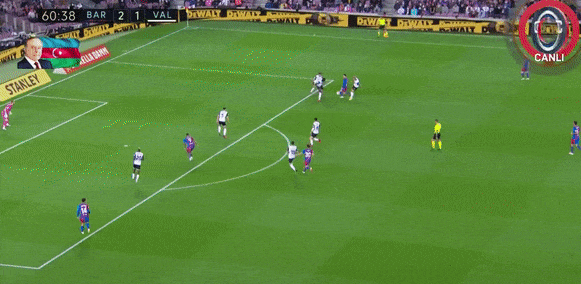
Whenever you ask a player to cover such huge spaces, he won’t be able to do it alone no matter his defensive quality. And that’s the core of Barcelona’s issues out of possession. They are very disjointed when pressing and lack any sort of real compactness in their mid or high blocks. That makes it very easy for teams to cut them apart, even if they’re not necessarily firing on all cylinders, just as is the case with Valencia.
Let’s get back to Busquets for a little bit again. The position of a defensive midfielder or a pivot at Barcelona is key. Not only is he tasked with orchestrating attacks but is also the wall between the opposition and Barcelona’s defensive line. Of course, he should never carry that burden on his own but lately, that’s exactly what’s been happening. Busquets is often criticised for lacking the legs and being eliminated in defensive transitions but he’s always lacked pace and has always been lanky. And yet, Barcelona never really struggled due to that.
They struggle because they leave him on an island, isolated and forced to cover multiple targets across a very huge space on the pitch. Take the following image as an example. It’s Busquets against the world and seconds later, he’s taken out of the equation too and you can see him raising his arms in disbelief. And who can blame him?
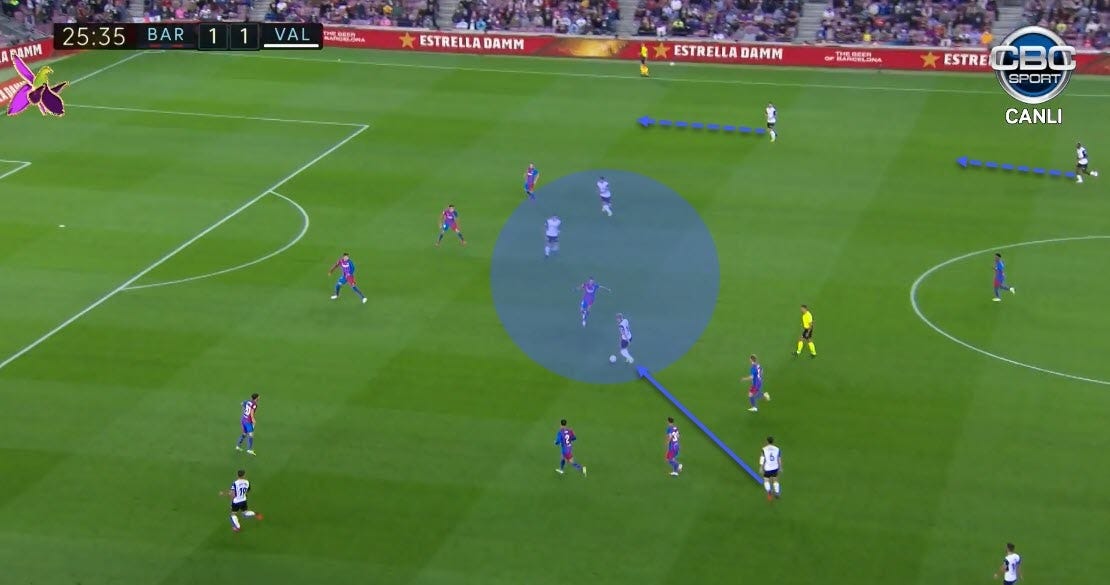
Another player who represented Barcelona’s issues in defence yesterday was young Gavi. Of course, him getting booked is becoming a meme online but it’s also representative of the more underlying issues in Koeman’s defensive system. Yes, Gavi is only 17 and very eager to rush into challenges. His temper, youth and inexperience make him a very easy target for referees and that has resulted in him getting booked four times in eight Barcelona appearances.
A lot of that is solely on him, yes. After all, a similar thing happened when he played for Spain under Luis Enrique. But the problem is that Barcelona’s lacking defensive system increases the margin for error and forces players like Gavi into these unfavourable situations far more often. Tactical fouling is key, especially for a possession-based team like Barcelona who will inevitably face many transitions but it’s also key to spread those fouls across the team.
Having Gavi in a position of getting booked week in, week out is suboptimal as it curbs his usual aggression, both on and off the ball. Sadly, that’s not everything and even in the attacking phase, Barcelona exhibited some of their usual flaws. Chance creation was shaky and mostly covered up by Fati’s incredible skill and talent, scarily reminiscent of another player masking the team’s issues for many years.
But Fati is back now. And so is hope. Of course, football is a team game and only a proper team can come out on top. There were reasons to be happy with yesterday’s win and no one should take it for granted. But we’re not there just yet. Far from it.
This week is crucial so Koeman better get back to the drawing board.

